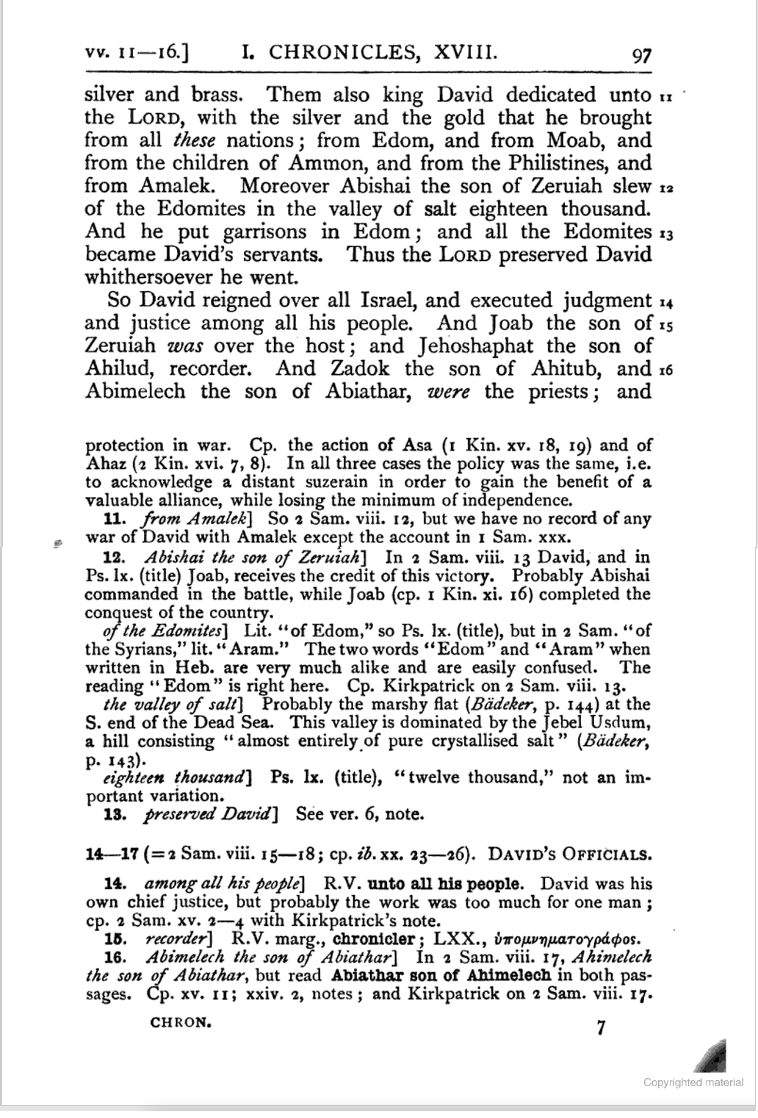The Cambridge Bible for Schools and Colleges on the words Edom and Aram in I Chronicles 18:12
The following text is reproduced from page 97 of The Cambridge Bible for Schools and Colleges. The Books of Chronicles. A limited version of this book may be viewed freely at Google Books. Below we shall provide a facsimile of the page to which we refer. It presents I Chronicles chapter 18, verses 11 through 16, and has copious notes concerning various aspects of the translation. Here we are interested in the notes for verse 12, which explains the common confusion of the words Aram, or Aramaean, and Edom, or Edomite, which are very similar in Hebrew. Aram is usually translated as Syria in the King James and other versions, while Aramaean is usually Syrian.
| vv. 11-16.] | I. CHRONICLES, XVIII. | 97 |
silver and brass. Them also king David dedicated unto the Lord, with the silver and the gold that he brought from all these nations; from Edom, and from Moab, and from the children of Ammon, and from the Philistines, and from Amalek. Moreover Abishai the son of Zeruiah slew of the Edomites in the valley of salt eighteen thousand. And he put garrisons in Edom; and all the Edomites became David's servants. Thus the Lord preserved David whithersoever he went. | 11
12 13
|
So David reigned over all Israel, and executed judgment and justice among all his people. And Joab the son of or Zeruiah was over the host; and Jehoshaphat the son of Ahilud, recorder. And Zadok the son of Ahitub, and Abimelech the son of Abiathar, were the priests; and | 14 15 16 |
protection in war. Cp. the action of Asa (I Kin. xv. 18, 19) and of Ahaz (2 Kin. Xvi. 7, 8). In all three cases the policy was the same, i.e. to acknowledge a distant suzerain in order to gain the benefit of a valuable alliance, while losing the minimum of independence.
11. from Amalek] So 2 Sam. viii. 12, but we have no record of any war of David with Amalek except the account in I Sam. xxx.
12. Abishai the son of Zeruiah] In 2 Sam. Viii. 13, David, and in Ps. lx. (title) Joab, receives the credit of this victory. Probably Abishai commanded in the battle, while Joab (cp. I Kin. xi. 16) completed the conquest of the country.
of the Edomites] Lit. “of Edom,” so Ps. lx. (title), but in 2 Sam. “of the Syrians,” lit. “Aram.” The two words “Edom” and “Aram” when written in Heb. are very much alike and are easily confused. The reading “Edom” is right here. Cp. Kirkpatrick on 2 Sam. viii. 13.
the valley of salt) Probably the marshy flat (Bädeker, p. 144) at the S. end of the Dead Sea. This valley is dominated by the Jebel Usdum, a hill consisting “almost entirely of pure crystallised salt” (Bädeker, p. 143).
eighteen thousand] Ps. lx. (title), “twelve thousand,” not an important variation.
13. preserved David] See ver. 6, note.
14-17 (= 2 Sam. Viii. 15-18; cp. ib. xx. 23-26). David’s Officials.
14. among all his people] R.V. unto all his people. David was his own chief justice, but probably the work was too much for one man; cp. 2 Sam. xv. 2-4 with Kirkpatrick's note.
15. recorder] R.V. marg., chronicler; LXX., ὑπομνηματογράφος.
16. Abimelech the son of Abiathar] In 2 Sam. Viii. 17, Ahimelech the son of Abiathar, but read Abiathar son of Ahimelech in both passages. Cp. xv. 11; xxiv. 2, notes; and Kirkpatrick on 2 Sam. viii. 17.
Below is a facsimile of the page which we have reproduced in text here:







